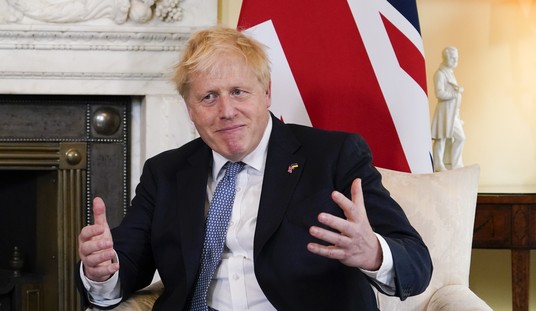Picture it. A great ship hurtling through the sea and, thanks to technology, faster than any had ever done before. In every direction the water is so glassy calm it reflects the twinkling of the stars. Aboard the vessel lights are blazing and the band plays on. In seeming command of all is a white-haired captain, one in a long line of skippers from an old firm. There is no outward sign of it but anxiety fills the air. There is a strangeness about the night. The charts show the ship in the wrong place. Landfall is not where it should be. We are talking of course about Western Civilization in 2023, led by the venerable Joe Biden, on its way toward the End of History.
It set off in what was called the Unipolar Moment when “the fall of the Berlin Wall in 1989 and the formal dissolution of the Soviet Union in 1991 heralded a unipolar moment of unquestioned American economic, diplomatic, military and geopolitical supremacy on the world stage.” For some it was the only era they knew. one where the world was theirs to reshape. “As a millennial born in 1989, the unipolar moment is all my generation has ever known. … With the rise of China and the return of great-power competition, that unipolar era is, for all intents and purposes, now over. … That sober conclusion is … America is not all-powerful and America is incapable of crafting the world in its own image.”
In contrast to that era of seeming certainty the present feels like a time with no dominant center, the endeavor a painted ship upon a painted sea. Russia and China are in demographic free-fall and not obvious heirs to any world primacy. So many things are simultaneously changing it is hard to tell where things are going from a single point of view. All we have are disparate Rashomon-like stories of an ongoing, unfolding mystery. We plod on regardless.
The priorities of the Biden administration — the chart of the captain — apart from the nods to “climate change” and “racial equity” — revolve around the theme of “restoring.” Biden “will build our economy back … reform our long-broken and chaotic immigration … restore America’s standing in the world.” It’s the mantra of a ship searching for a lost port. Yet deep in their hearts many fear that the window is closing on the great progressive projects of the late 20th century. The plans for a world order, either the old one or the reboot described as the Great Reset, are finished. The resulting anxiety makes the officers on the bridge cling to the relics and bygone causes ever more desperately, not from confidence but from panic.
But what comes next? The talking points suggest that with the failure of the progressive agenda, the Nazi era of the 1930s will return. But this is unlikely. The past never actually returns. The future will always be something new and different — that worries the status quo. But anticipating an historical paradigm shift can be hard because it often emerges unexpectedly from seemingly unrelated cumulative change, to startle us like an iceberg looming out of the dark. For those uncomfortable with surprise the solution is to post lookouts in the hope that analysts and polls, like Oceangate submersible’s acoustic sensors, can detect any big changes in time to warn of them.
Even if they spot it the recent past suggests that they wouldn’t do much. The recent Covid pandemic conducted a real world test of the international system’s ability to respond, learn and adapt to a rapidly developing threat. The establishment reacted by protecting its power and prioritizing the image of action rather than effective activity. It did not exactly cover itself with glory. The institutions are probably going to react exactly as they did with Covid in the face of a next big transformation: move defensively and slowly.
Yet this is not the first time people have faced challenges. It’s probable that humanity, indeed all life as we know it, has met discontinuities and paradigm shifts many times before. In humanity’s case, things like family, religion and dispersal are legacies of successful survival strategies from time immemorial against surprise. Ancient things are sometimes there for a reason not readily apparent to someone persuaded that safety and prosperity are rights. As Taleb pointed out, some things only come alive as a result of stressors, shocks, volatility, noise, mistakes, faults, attacks, or failures. For a long time they were considered useful, then they became surplus.
Today the establishment is prepared to meet the unknown challenges without the lifeboats of the past. For over 200 years politicians have promoted the belief that Utopia could be achieved by state action and with it the conviction that the family, a patriarchal institution of oppression, could be dispensed with. Religion is now mocked. The frontiersman, once home on the range, is now regarded as an environmental vandal, replaced in modern myth by the denizen of the 15 minute city where “most daily necessities and services, such as work, shopping, education, healthcare, and leisure can be easily reached by a 15-minute walk or bike ride from any point”.
Yet like so many other things in this new age of uncertainty, institutional confidence is no longer as great as it once was. The emptiness of boat deck has some worried. This new doubt is reflected in the curious controversy surrounding the movie Sound of Freedom, whose anti-child trafficking theme is seen as dangerous muttering of the passengers in steerage. Variety warns: “Rolling Stone called ‘Sound of Freedom’ a ‘QAnon-tinged thriller,’ one that is designed to ‘appeal to the conscience of a conspiracy-addled boomer.'” Perhaps it’s the sound of doubt, of people beginning to suspect the great ship is on a voyage to nowhere, or worse, that there’s an iceberg in the dark.










